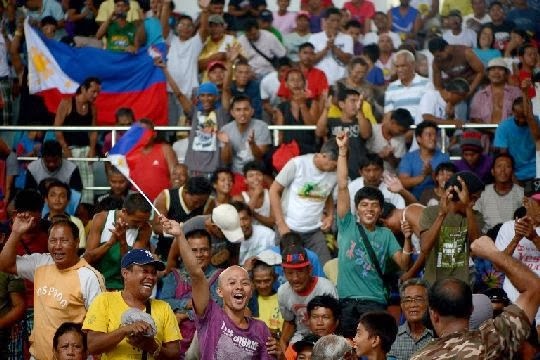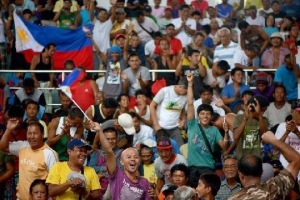The word victim, according to the Merriam-Webster dictionary, is someone or something that was harmed by an unpleasant event. For us Haiyan survivors, we are not only victims of a natural disaster, but we are also victims of our government.
But nevertheless, we don’t act like we are.
Right after the storm, we, the Taclobanons, did not have time to mourn for what we lost. We began to pick up the pieces, whether those pieces were broken furniture, mud covered clothes or frozen bodies. A few hours after the storm, you’d see people walking down the streets, checking on neighbors , friends and even to those they did not know. We just survived a record breaking storm, yet it didn’t break our spirit.
Because our roads were blocked with debris and our airports were damaged, the relief goods came slow. And with our President being hesitant to help our city because we were “unprepared” for a world record storm, help came slower.
As the days passed by, all eyes were on us. Choppers with cameras began circling our island, with famous TV logos on the side. The world was getting to know our little region, which was once just a dot on the map. Every move was recorded, our stories flashed onto TV. And when citizens began to breaking into grocery stores and malls, scouring for goods and necessities, our President called them “thieves”, and his right hand man asked us what we “needed”, as if he didn’t know what to do during a crisis. As we struggled to survive, our own government judged us and looked at us like we were rats.
And when the smell of the dead began to pollute the air, it was more dreadful. People fled from their houses to find shelter in evacuation centers and homes of friends and relatives. Houses became empty and unguarded. Everything left to the hope that there was something to return to.
Prisoners who escaped during the storm caused anxiety for many, as murderers and convicted criminals walked along the streets with us, their identity unknown. A few days later some of them would do an open fire in a village in the middle of the day, causing people to flee and even leave their vehicles on the side of the road as they stumbled to stay alive.
Soon we would learn that in this calamity, we were all equal. No one was rich, no one was poor. We were all on ground zero. Big houses were easily flicked by the storm surges, along with the small houses of people who were less privileged. Even our own politicians were victims, struggling to make each day count as they served the people who like them, lost something.
And to our Mayor who was on his third and final term, he lost almost everything he worked for the time he was in office.
But the problems were just beginning. We were short on medical help because the doctors and nurses were victims themselves. Our policemen were either missing or struggling to put a roof over their heads. Our schools were used as evacuation centers, some buildings lucky enough to not have at least one dead body inside. Our leaders were victims too, some unable to carry on with their duty as they coped with what happened.
But survive we shall.
Soon international aid came flying through our skies, bringing promise and hope. But when our government finally stepped in, they made these aids do a detour. Though planes after planes came everyday, my family and I never received even a small can of sardines from them. Rumors of these goods said that they were sent to the town next to us, whose former Congressman was apparently close with the President. But Taclobanons stood strong, through the hunger and the loss.
Most survivors fled to the main cities, boarding army planes or traveling by land. Some, travelled by foot. There was nothing left, they would say. And in truth, there really was nothing left. As one famous local reporter said right after the storm: “Tacloban is now a wasteland.”
A few days later there was talk of Martial Law, where the military and the President would take over our city. Police cars and army trucks from all over the country began to fill our streets. Soon a curfew was implemented. No one was allowed to roam the streets after eight in the evening, but the streets were open at five in the morning. And just when we thought that we were safe, rumors of multiple break-ins, murders and rape began to surface. I remember waking up to policemen firing their guns at a suspect, as they ran through our street. Restless nights began to take over the people, as they stood watch for their houses and of their neighbors. It was like a neighborhood nightwatch, with the people helping each other in the time of need. It was dead silent at night, as people anticipated of what was to come.
For those who seeked refuge in other cities, some were shunned when they asked for help by government centers. They struggled to adjust and find a place to live. Some found a home in a relative’s house, but some unlucky ones did not. It was a second life for all of us and most of us were starting from scratch.
The dead were collected and buried, but thousands of them are still undiscovered and some were buried into people’s backyards. Our government told everyone that only thousands have died, when it should be ten thousands. Lies were told to “calm” people down, when it really angered us, questioning the competence of our politicians.
Through Haiyan, we have learned about the people we’ve elected, and those who should have been elected. We have learned to not depend on the government, and grew a bond with other survivors. Haiyan showed us that though we are from different walks of life, we all have lost something, connecting us in some sort of way. The storm that was supposed to break our hearts, strengthened us with a new found hope that tomorrow was another day.
And now, a month later, we still struggle. Though help is slow and the government betraying us and showing their true colors, we stay firm. Though the sound of gunshots still echo through our streets, we are brave. Though food and drinking water is scarce, we do what we can to keep our family upfloat. Stores are slowly opening, oil companies are sending their trucks, and people are making the best of what is given. People from different parts of the country have settled here, to help with what they could. There is always a rainbow after the rain, a beam of hope that beats through every Filipino’s heart.
Though we are victims, we never act as defined. We are survivors, struggling to stand even though our legs are weak. We have redefined what being a “victim” is. We may be weak, we may have been battered with the calamity, we may be hungry for the truth, our hope for the future is unshaken. We are survivors, and though what it left is barely enough, we find strength to make it through.
———————————
Since I can’t seem to find a newspaper to publish this (I’ve submitted this to four publications) since it bluntly says the truth of what happened, I have shared it here. I hope you share this, since the media has already told enough fiction and I think the world deserves the truth.


I agree – people need to know the real story. Thank you so much for sharing this.
I have a good friend in the same situation. I hope your story gets some international attention.
Even here in the US it is hard to get the honest truth out–how much harder in a small area like yours. Have you tried sending it to the NY Times (maybe the editorial section would accept it)–send it to some of the US Radio Stations–EMAIL them this story–it should be heard. Yes, you are victims of a horrific natural calamity, but more important you are also survivors–Hum–maybe you should
How awful that some turned and caused more harm instead of help. 🙁 Your post is heartfelt and I'm very sorry so much turmoil is going on. I love that your faith in your city comes through your words.
It always hurts me reading your posts and there is nothing I can do to help.. but to offer my prayers and ((HUGS))… soo hope it will get better soon.. keeping you and your family in my prayers…
interesting information
How sad that help came so slowly to your city. Your president sounds like a low down scoundrel. How could he let people suffer like that and help the town next to you? Hopefully he will NOT become president ever again. <br />You are a SURVIVOR and I applaud you.
Thank you for your brutal honesty. I think that it is so sad that the media tries to cover up the reality of the situation and that people are suffering because of it. My thoughts and prayers are with you.
What a sad story about the lack of help you have received in your city. I hope people begin to realize the truth of what is happening.
I pray for you and the fast country recovery, I now it takes time to get to final point. Take care of yourself, we all humans and have to support each other, do not let that temporary downs take over you.
I can't believe that they're not doing what they're supposed to do. After all that your people have been through. You deserve a lot more than this. Sending prayers to the people there. 🙁
I like what you said…Though victims, they are survivors. Nicely put
How horrible. 🙁 You guys went through such horror. We saw the pictures, we saw the stories, and this takes it one step further. Great piece, wish it had been accepted by a newspaper and displayed to the world.
Good For YOU!!! Good for you to put this out there! The way your President acted is despicable.
I can't even imagine what you have went through. This was beautifully written and I hope it crosses the path of someone that might take the time too read it and learn from the words you have written.
Touched by your post! keep it up babe! ;'))
It's nice to see an air of optimism from you and I hope Tacloban recovers soon. I too was a survivor of the 1990 earthquake in Baguio that also had everyone on equal footing. I hope all the help come your way as Tacloban rebuilds.
I really cannot imagine living through something such as that you have described in such detail. There is strength to be found as a survivor, and I believe you have found that.<br />Love Vicky<br />http://aroundandaroundandupsidedown.blogspot.co.uk/
Wow. Thank you for sharing the truth here!
Thank you for sharing the truth here!
WOW!!